“Antimalware” is a computer virus, which masquerades as genuine security software, while actually reporting non-existent malware threats in order to scare the user into paying for this rogue security software.
![Antimalware virus [Image: Antimalware virus]](http://malwaretips.com/blogs/wp-content/uploads/2013/10/Antimalware-virus.jpg)
- What is Antimalware?
- How did Antimalware virus got on my computer?
- Am I infected with Antimalware virus?
- How to remove Antimalware virus (Removal Guide)
- STEP 1 : Start your computer in Safe Mode with Networking
- STEP 2: Run RKill to terminate the malicious processes associated with Antimalware
- STEP 3: Remove Antimalware virus with Malwarebytes Anti-Malware FREE
- STEP 4: Remove Antimalware rootkit with RogueKiller
- STEP 5: Remove Antimalware infection with HitmanPro
What is Antimalware?
Antimalware is a rogue anti-virus program from the Rogue.WinWebSec family of computer infections. This program is classified as a rogue because it pretends to be an anti-virus program, but will instead displays bogus scan results, report non-existing computer infections, and does not allow you to run your normal applications.
In this case, not only is Antimalware going to disrupt your system, it’s going to try and trick you into making a purchase using your credit card.
Antimalware appears in the form of a fake Windows warning on your computer system that reads you have a specific number of viruses on your computer (usually in the hundreds) and that this software has detected those viruses. To get rid of them you must purchase the full-version of Antimalware. It’s important to remember that by purchasing the “claimed full version to remove the viruses” you will be submitting your personal information to unscrupulous persons and may also end up being a victim of credit card or identity fraud or theft.
To protect itself from being removed, Antimalware will also terminate any application you try to run on your computer. It does this to protect itself from being removed by legitimate security programs and to scare you into thinking your programs are infected. When this infection terminates a program it will display a message similar to the following:
Windows Security Alert
Windows reports that computer is infected. Antivirus software helps to protect your computer against viruses and other security threats. Click here for the scan your computer. Your system might be at risk now.
How did Antimalware virus got on my computer?
Antimalware is distributed through several means. Malicious websites, or legitimate websites that have been hacked, can infect your machine through exploit kits that use vulnerabilities on your computer to install this rogue antivirus without your permission.
Another method used to propagate Antimalware is spam email containing infected attachments or links to malicious websites. Cyber-criminals spam out an email, with forged header information, tricking you into believing that it is from a shipping company like DHL or FedEx. The email tells you that they tried to deliver a package to you, but failed for some reason. Sometimes the emails claim to be notifications of a shipment you have made. Either way, you can’t resist being curious as to what the email is referring to – and open the attached file (or click on a link embedded inside the email). And with that, your computer is infected with the Antimalware virus.
The threat may also be downloaded manually by tricking the user into thinking they are installing a useful piece of software, for instance a bogus update for Adobe Flash Player or another piece of software.
The Antimalware infection is also prevalent on peer-to-peer file sharing websites and is often packaged with pirated or illegally acquired software.
Am I infected with Antimalware virus?
Some examples of the interface, fake alerts, fake scanning results, and pop-ups displayed by Antimalware are shown below:
![Antimalware Proven Antivirus Protection [Image: Antimalware Proven Antivirus Protection]](http://malwaretips.com/blogs/wp-content/uploads/2013/10/Antimalware.jpg)
![Antimalware Spyware Alert [Image: Antimalware Spyware Alert]](http://malwaretips.com/blogs/wp-content/uploads/2013/10/Antimalware-Spyware-Alert.jpg)
![Antimalware Alert [Image: Antimalware Alert]](http://malwaretips.com/blogs/wp-content/uploads/2013/10/Antimalware-Alert.jpg)
![Antimalware Internet Explorer Warning [Image: Antimalware Internet Explorer Warning]](http://malwaretips.com/blogs/wp-content/uploads/2013/10/Antimalware-Internet-Explorer-Warning.jpg)
How to remove Antimalware virus (Removal Guide)
This page is a comprehensive guide, which will remove the Antimalware infection from your your computer. Please perform all the steps in the correct order. If you have any questions or doubt at any point, STOP and ask for our assistance.
STEP 1: Start your computer in Safe Mode with Networking
STEP 2: Run RKill to terminate Antimalware malicious processes
STEP 3: Remove Antimalware virus with Malwarebytes Anti-Malware Free
STEP 4: Remove Antimalware rootkit with RogueKiller
STEP 5: Remove Antimalware infection with HitmanPro
STEP 1 : Start your computer in Safe Mode with Networking
- Remove all floppy disks, CDs, and DVDs from your computer, and then restart your computer.
- When the computer starts you will see your computer’s hardware being listed. When you see this information start to gently tap the F8 key repeatedly until you are presented with the Windows XP, Vista or 7 Advanced Boot Options.
![Windows F8 key [Image: F8 key]](//malwaretips.com/blogs/wp-content/uploads/2013/06/F8-key.jpg.png)
If you are using Windows 8, press the Windows key + C, and then click Settings. Click Power, hold down Shift on your keyboard and click Restart, then click on Troubleshoot and select Advanced options. In the Advanced Options screen, select Startup Settings, then click on Restart. Alternatively, you can read this guide to start Windows 8 in Safe Mode with Networking. - If you are using Windows XP, Vista or 7 in the Advanced Boot Options screen, use the arrow keys to highlight Safe Mode with Networking , and then press ENTER.
![Safe Mode with Networking screen [Image: Safemode.jpg]](//malwaretips.com/images/removalguide/safemode.jpg) \
\
If you are using Windows 8, press 5 on your keyboard to Enable Safe Mode with Networking.
Windows will start in Safe Mode with Networking.
STEP 2: Run RKill to terminate the malicious processes associated with Antimalware
RKill is a program that will attempt to terminate all malicious processes associated with Antimalware, so that we will be able to perform the next step without being interrupted by this malicious software.
Because this utility will only stop Antimalware running process, and does not delete any files, after running it you should not reboot your computer as any malware processes that are configured to start automatically will just be started again.
- While your computer is in Safe Mode with Networking ,please download the latest official version of RKill.Please note that we will use a renamed version of RKILL so that Antimalware won’t block this utility from running.
RKILL DOWNLOAD LINK (This link will automatically download RKILL renamed as iExplore.exe) - Double click on iExplore.exe to start RKill and stop any processes associated with Antimalware.
![Rkill renamed to iExplore.exe [Image: RKILL Program]](//malwaretips.com/blogs/wp-content/uploads/2013/01/rkill-run-as-admin.jpg)
- RKill will now start working in the background, please be patient while the program looks for Antimalware malicious process and tries to end them.
![RKill while killing Antimalware malicious process [Image: RKILL stoping malware]](//malwaretips.com/blogs/wp-content/uploads/2013/01/rkill-program.jpg)
If you get a message from Antimalware stating that RKill is an infection, and then closes this utility, leave the warning on the screen and then run RKill again.
By not closing the warning, this typically will allow you to bypass the malware trying to protect itself so that RKill can terminate Antimalware. - When the Rkill utility has completed its task, it will generate a log. Do not reboot your computer after running RKill as the malware programs will start again.
![RKill Log [Image: RKill Report]](//malwaretips.com/blogs/wp-content/uploads/2013/01/rkill-report.jpg)
STEP 3: Remove Antimalware virus with Malwarebytes Anti-Malware FREE
Malwarebytes Anti-Malware Free is a powerful on-demand scanner which will remove Antimalware malicious files from your computer.
- You can download Malwarebytes Anti-Malware Free from the below link, then double-click on the icon named mbam-setup.exe to install this program.
MALWAREBYTES ANTI-MALWARE DOWNLOAD LINK(This link will open a download page in a new window from where you can download Malwarebytes Anti-Malware Free) - When the installation begins, keep following the prompts in order to continue with the setup process, then at the last screen click on the Finish button.
![Malwarebytes Anti-Malware installation screen [Image: Malwarebytes Anti-Malware final installation screen]](//malwaretips.com/blogs/wp-content/uploads/2013/01/malwarebytes-installation.jpg)
- On the Scanner tab, select Perform quick scan, and then click on the Scan button to start searching for the Antimalware malicious files.
![Run a Quick Scan with Malwarebytes Anti-Malware [Image: Malwarebytes Anti-Malware Quick Scan]](//malwaretips.com/blogs/wp-content/uploads/2013/01/malwarebytes-quick-scan.jpg)
- Malwarebytes’ Anti-Malware will now start scanning your computer for Antimalware virus as shown below.
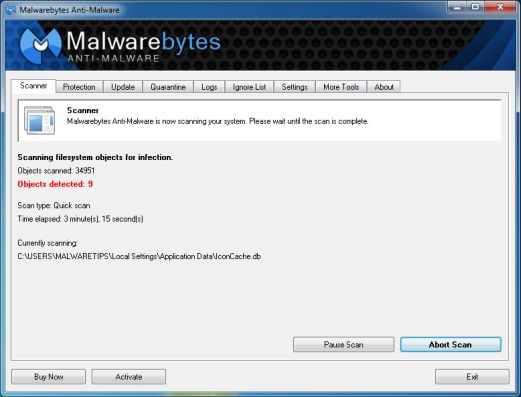
- When the Malwarebytes Anti-Malware scan has finished, click on the Show Results button.
![Malwarebytes when the system scan has completed [Image: Malwarebytes Anti-Malware scan results]](//malwaretips.com/blogs/wp-content/uploads/2013/01/malwarebytes-scan-results.jpg)
- You will now be presented with a screen showing you the computer infections that Malwarebytes Anti-Malware has detected. Make sure that everything is Checked (ticked), then click on the Remove Selected button.
![Malwarebytes Anti-Malwar removing Antimalware virus [Image: Malwarebytes Anti-Malwar removing Antimalware virus]](//malwaretips.com/blogs/wp-content/uploads/2013/01/malwarebytes-virus-removal.jpg)
- Once your computer will restart in Windows regular mode, open Malwarebytes Anti-Malware and perform a Full System scan to verify that there are no remaining threats.
STEP 4: Remove Antimalware rootkit with RogueKiller
RogueKiller is a utility that will scan for the Antimalware rootkit, registry keys and any other malicious files on your computer.
- You can download the latest official version of RogueKiller from the below link.
ROGUEKILLER DOWNLOAD LINK (This link will automatically download RogueKiller on your computer) - Double click on RogueKiller.exe to start this utility and then wait for the Prescan to complete.This should take only a few seconds, then click on the Scan button to perform a system scan.
![Click on the Start button to perform a system scan [Image: RogueKiller scaning for Antimalware virus]](//malwaretips.com/blogs/wp-content/uploads/2013/02/roguekiller-scan.jpg)
- After the scan has completed, press the Delete button to remove Antimalware malicious registry keys or files.
![Press Delete to remove Antimalware [Image: RogueKiller Detele button]](//malwaretips.com/blogs/wp-content/uploads/2013/02/roguekiller-delete.jpg)
STEP 5: Remove Antimalware infection with HitmanPro
HitmanPro is a second opinion scanner, designed to rescue your computer from malware (viruses, trojans, rootkits, etc.) that have infected your computer despite all the security measures you have taken (such as anti virus software, firewalls, etc.).
- You can download HitmanPro from the below link:
HITMANPRO DOWNLOAD LINK (This link will open a web page from where you can download HitmanPro) - Double-click on the file named HitmanPro.exe (for 32-bit versions of Windows) or HitmanPro_x64.exe (for 64-bit versions of Windows). When the program starts you will be presented with the start screen as shown below.
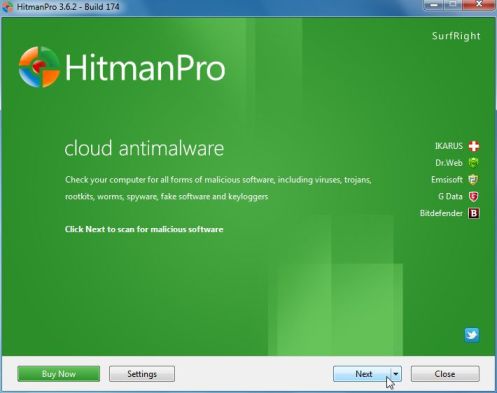
Click on the Next button, to install HitmanPro on your computer.
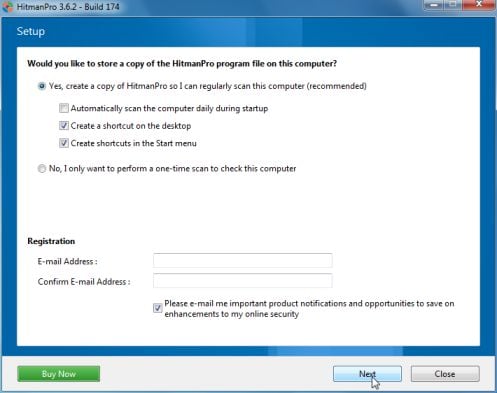
- HitmanPro will now begin to scan your computer for Antimalware trojan.
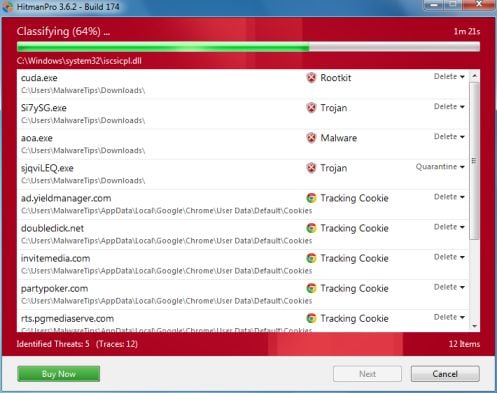
- When it has finished it will display a list of all the malware that the program found as shown in the image below. Click on the Next button, to remove Antimalware virus.
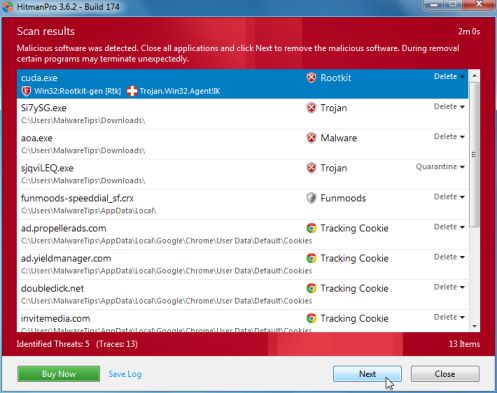
- Click on the Activate free license button to begin the free 30 days trial, and remove all the malicious files from your computer.
![HitmanPro free 30 days trial [Image: HitmanPro 30 days activation button]](//malwaretips.com/blogs/wp-content/uploads/2012/11/hitmanpro-activation.jpg)
Your computer should now be free of the Antimalware infection. If your current anti-virus solution let this infection through, you may want to consider purchasing the PRO version of Malwarebytes Anti-Malware to protect against these types of threats in the future, and perform regular computer scans with HitmanPro.
If you are still experiencing problems while trying to remove Antimalware from your machine, please start a new thread in our Malware Removal Assistance forum.

![Remove "Antimalware" virus (Removal Guide) 1 [Image: Antimalware virus]](https://malwaretips.com/blogs/wp-content/uploads/2013/10/Antimalware-virus.jpg)
![Windows F8 key [Image: F8 key]](http://malwaretips.com/blogs/wp-content/uploads/2013/06/F8-key.jpg.png)
![Safe Mode with Networking screen [Image: Safemode.jpg]](http://malwaretips.com/images/removalguide/safemode.jpg) \
\![Rkill renamed to iExplore.exe [Image: RKILL Program]](http://malwaretips.com/blogs/wp-content/uploads/2013/01/rkill-run-as-admin.jpg)
![RKill while killing Antimalware malicious process [Image: RKILL stoping malware]](http://malwaretips.com/blogs/wp-content/uploads/2013/01/rkill-program.jpg)
![RKill Log [Image: RKill Report]](http://malwaretips.com/blogs/wp-content/uploads/2013/01/rkill-report.jpg)
![Malwarebytes Anti-Malware installation screen [Image: Malwarebytes Anti-Malware final installation screen]](http://malwaretips.com/blogs/wp-content/uploads/2013/01/malwarebytes-installation.jpg)
![Run a Quick Scan with Malwarebytes Anti-Malware [Image: Malwarebytes Anti-Malware Quick Scan]](http://malwaretips.com/blogs/wp-content/uploads/2013/01/malwarebytes-quick-scan.jpg)

![Malwarebytes when the system scan has completed [Image: Malwarebytes Anti-Malware scan results]](http://malwaretips.com/blogs/wp-content/uploads/2013/01/malwarebytes-scan-results.jpg)
![Malwarebytes Anti-Malwar removing Antimalware virus [Image: Malwarebytes Anti-Malwar removing Antimalware virus]](http://malwaretips.com/blogs/wp-content/uploads/2013/01/malwarebytes-virus-removal.jpg)
![Click on the Start button to perform a system scan [Image: RogueKiller scaning for Antimalware virus]](http://malwaretips.com/blogs/wp-content/uploads/2013/02/roguekiller-scan.jpg)
![Press Delete to remove Antimalware [Image: RogueKiller Detele button]](http://malwaretips.com/blogs/wp-content/uploads/2013/02/roguekiller-delete.jpg)




![HitmanPro free 30 days trial [Image: HitmanPro 30 days activation button]](http://malwaretips.com/blogs/wp-content/uploads/2012/11/hitmanpro-activation.jpg)


![Remove Giantadblocker.net Pop-ups [Virus Removal Guide] 7 McAfee scam 4](https://malwaretips.com/blogs/wp-content/uploads/2023/08/McAfee-scam-4-290x290.jpg)